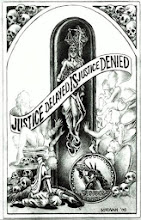
Killing spotlights people searches
Cliff Goldsmith, a private investigator based in Evesham, said he knows his profession already has a bad reputation. Dan Larsen of Evidence, Inc. in Omaha, Nebraska agrees.
Goldsmith said yesterday the arrest of a Philadelphia man who prosecutors claim used a Burlington Township-based private investigator to locate a Bucks County, Pa., man he has been charged with killing might leave his profession with, yet another, huge black eye.
"I just hope the negative backlash doesn't affect my profession too much," said Goldsmith, a member of the board of directors of the New Jersey Licensed Private Investigators Association Inc. "One bad apple could affect every hard-working private investigator." Larsen, who has offices in both Iowa and Nebraska, and is a past-president of the Iowa Association of Private Investigators says that there have been a number of incidents of loss of personal data by the same companies who provided data in this case.
In the case at hand, Stanford A. Douglas Jr., 29, of Philadelphia was arrested Sunday and charged with murdering William Berkeyheiser, 62. Berkeyheiser was shot six times with a handgun March 27 outside his home in Upper Makefield, Pa., according to Bucks County District Attorney Diane Gibbons.
Larsen said Douglas held a seven-year grudge against Berkeyheiser that led to the murder. Douglas, who is black, told police he had wanted to kill Berkeyheiser since 1998 when he over overheard Berkeyheiser, who is white, tell a joke with racial overtones, Gibbons said.
Police said Douglas told them he paid a private investigator $150 to track down Berkeyheiser's home address. At this point, police cannot say whether the private investigator in question was actually licensed to do business in any state, but they claim they are looking into that angle. The information leads them to a company in Connecticut.
According to John Ciaccio, chief executive officer of A-Plus Investigations Inc., Douglas hired his investigators to locate Berkeyheiser. Ciaccio said all of his company's business with Douglas was done by telephone and Douglas never visited the Burlington Township headquarters of A-Plus on Connecticut Drive in Crossroads Business Center, an industrial park near Interstate 295.
Citing client confidentiality and the fact that the investigation into Douglas' case was continuing, Ciaccio declined to comment further.
"We want to cooperate in the prosecution of this and we'll continue to cooperate," Ciaccio said. "Our thoughts and prayers are with (Berk-eyheiser's) family." Larsen related that his firm will "never provide personal data to a client, unless, and until that client has an attorney on retainer, who has an action on file."
According to Goldsmith, private investigators are not required by federal or state law to ask clients why they want to locate a person, but Larsen said most legitimate agencies wouldn't consider working for any client who wouldn't provide that information. "It's a matter of ethical morality," he said.
"There's really good and legitimate reasons that people need to locate someone 99 percent of the time," said John Stenton, a private investigator who owns Associate P.I., based in Evesham.
"Still, you always have those nuts out there that use the (private investigator) to get the information for something like this," he said.
Stenton said he has located estranged fathers and mothers, former husbands who owe child support, and old college or military friends among others during his 18 years as a private investigator.
Stenton said he has charged anywhere from $100 to $1,800 to locate someone. He said if a client's motives seem at all suspicious, he will not agree to a search.
Larsen also points out that this isn't the first time this sort of thing has happened. He mentioned the Amy Boyer case, where a stalker bought personal data from an unlicensed Florida firm, named DocuSearch, and the case of televison celebrity Rebecca Schaffer, where an unlicensed investigator in Arizona sold her driver's license information to a stalker, who then showed up at her door, and killed her.
This all points to evidence that the various state licensing laws should be looked at for enhancement, with strick background investigations done by competent law enforcement people; before licenses are issued. Once that is accomplished, enforcement of the laws that prohibit conducting private investigations outside the existing laws, should be strictly enforced, with serious penalties for violations.
Currently ONLY California and Florida have ongoing efforts, with qualified personnel assigned to investigate complaints of unlicensed activity. A few states are moving toward stricter enforcement of current statutes, but the bureacracies always seem to get into the way of real progress.


0 Comments:
Post a Comment
<< Home